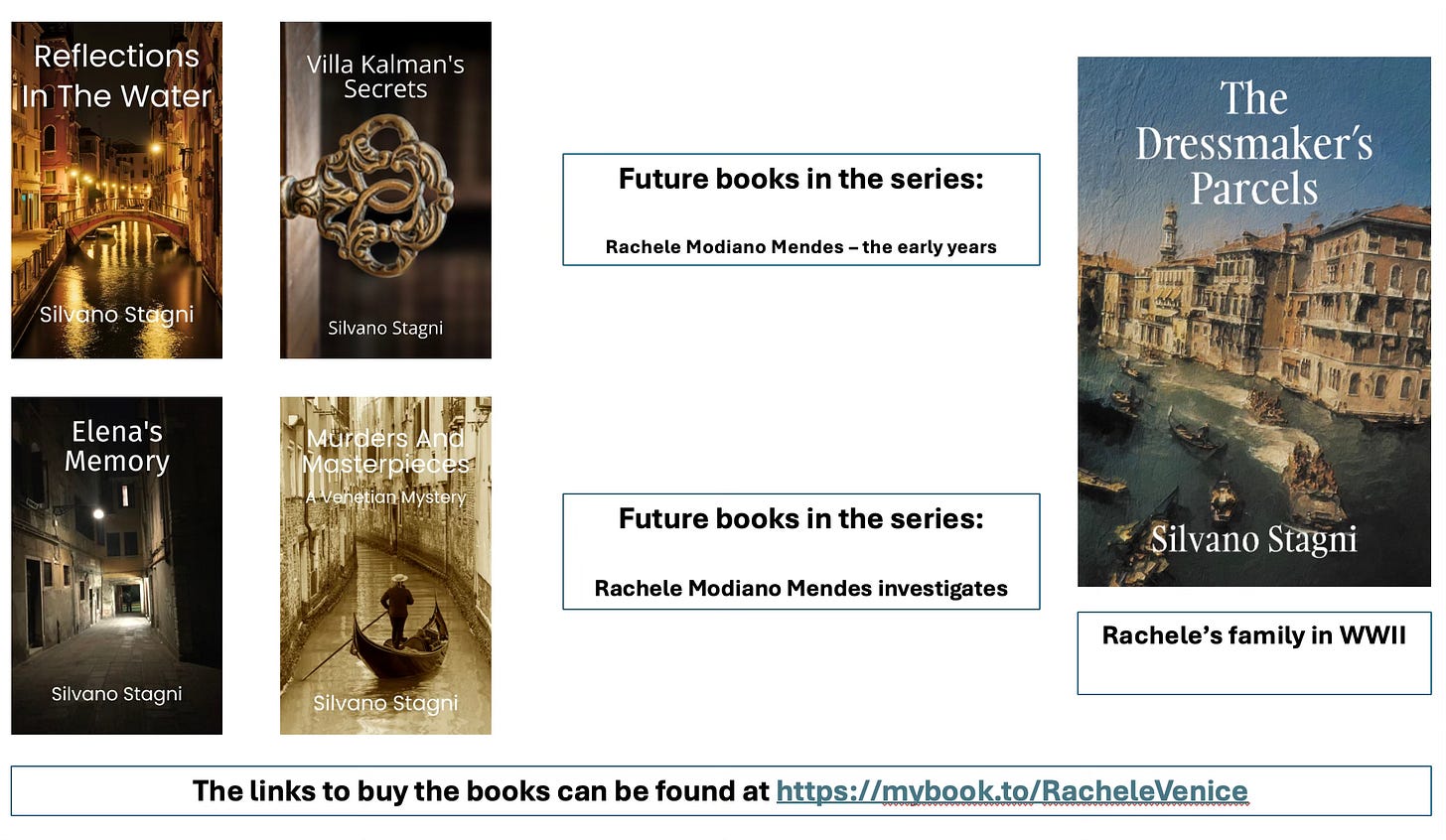Not every divorced father is a deadbeat, abusive man, or a serial cheater.
On ne dit pas, car c’est là un secret qui ne se partage pas, on ne révèle jamais l’incommensurable infini qui unit comme un ruban d’or, un père à sa fille, un ruban qui tourne suivant le vent, qui virevolte suivant le temps, qui fait de l’un et l’autre des tisseurs enchantés. [Daniella Pinkstein]
You can never reveal the incommensurable infinity that links a father to his daughter like a golden thread, a thread that turns with the wind, that twirls following time, that makes them enchanted weavers. You cannot describe it, it is a secret that cannot be shared. [Daniella Pinkstein, translated by Silvano Stagni]
I have decided to keep my Substack free. However, if you decide to support my work, you can ‘buy me a coffee’ a one-off tip by clicking on this link, or you could buy one of my books (the Amazon link is in the caption of the image at the end of this post) or keep reading my posts, it is entirely up to you.“My name is Silvano, and I am a divorced father.” That would be my introduction if I were to stand up and speak at a hypothetical Divorced Father Anonymous meeting. My daughters are now adults (28 in August and 25), qualified professionals with busy lives. They don’t have time for their father. At least, this is what I tell others when they ask me how they are. I don’t want to say I don’t know.
Divorce turns one household into two. I was luckier than most because my daughters' mother and I never stopped being parents together. We knew each other well, and over time, we developed a friendship: a parental camaraderie, we were a team raising our daughters. We separated when they were very young. When I mentioned we could wait a bit, she replied, “If we do it now, we'll continue talking to each other; if we wait, we’ll throw daggers at each other.” It was true. She was right. For the first five years, we would have dinner as a family every Sunday evening. Our daughters even filed a formal complaint because we were talking to each other too much, and they couldn’t play one against the other like some of their schoolmates used to do.
Unfortunately, I did not have an easy life post-divorce. Nothing to do with the divorce. It is what happened to me. During the first six months of life as a ‘new single man’, I became seriously ill (septicaemia is no walk in the park) and could not work for four months. I lost my job, and it became difficult to find another one. Freelancing was not bringing in enough money. I lost my home, and a friend (living abroad) rescued me by suggesting I should move in with his mother until I found something else.
That reduced my time with my daughters. Although my ex-wife was understanding, she did not enjoy not having the money I could not provide (because I wasn’t earning any). By the time I found a job, our daughters were teenagers, eager to live their lives with as little parental interference as possible. By then, I was seeing them for a couple of hours each Sunday. I could contribute, and I did throughout our older daughter’s time at Cambridge. Unfortunately, by the time our younger daughter went to university, the company I was working for had been bought by another one. My department was closed, and I was let go. I was three years away from my retirement age, so finding another job was difficult. I went back to freelancing, but I could not provide for my younger daughter. Keeping a roof over my head was the only thing I could do.
This long preamble explains why we failed to weave the thread Daniella Pinkstein mentions. I appreciate my daughter’s resentment over the lack of money. The last time I saw them was in 2019, if not 2018 (They would have been 21 and 18). I occasionally spoke on the phone, but sometimes the conversation became tense, like any conversation between a parent and a child in their late teens or early twenties. I did not have the chance to clarify any misunderstanding. I tried. I had a good relationship with their mother. We spoke every other month, sometimes more often. Since 2019, she has kept me informed about any news in our daughters’ lives, but that source of information ended when their mother suddenly died last September (2024). My direct contacts are mostly WhatsApp messages, occasionally read, seldom replied.
Divorce did not create the habit of spending time with their father. My extended family was smaller and somewhere else. I couldn’t offer uncles and aunts, let alone cousins. Therefore, whenever there was a relative visiting, time with Dad was skipped, and their mother had a lot of relatives (I thought I came from a large clan; trust me, it was nothing compared to hers. I know, I met and liked a lot of them). To be fair, whenever my mother was visiting, she spent time with the girls every day. Although I am sure their mother never spoke badly about me, I do not have the same certainty about her close family.
Rationally, I remember that, at their age, I was more focused on my life than on time with my parents. I started checking on them regularly after I turned thirty. Emotionally, whenever something goes wrong, my sense of failure as a father resurfaces. Although my sons remind me I am not a failure. Still, I may not have been a good provider, but I could have helped them with the tapestry of their personality. Allowing them to balance one parent's shortcomings with the other parent’s strengths (obviously, it would have worked both ways for me and their mother).
When they were under 12, we often visited museums. It was very stimulating to see how two young girls reacted to art and how they developed their distinct tastes. I also watched them learn to ice skate and swim. I saw them compete and realised I was my father’s son and was not surprised when they tactfully told me to be quiet or stay home (I remember having the same conversation with my father, more or less at the same age). For most of their teenage years, I spent a couple of hours with them each Sunday. I felt more like a visiting uncle than a parent.
You need time together to weave the tapestry mentioned by Daniella Pinkstein. You cannot do that two hours each Sunday. When my ex-wife and I separated I decided to take two steps back to make sure my children were not growing up in a war zone. The price I had to pay was not enough time with them. I tried my best with what I had.
Now, one daughter is a qualified lawyer working in a prestigious law firm, the other is an intensive care nurse. I miss being able to hug them since they lost their mother. Not sure if I could have helped, but we all need hugs in those moments. I need a hug, and I'm left here, not knowing. I don’t know what they like for breakfast. The last time I saw them sleep was in March 2001. I don’t know what they like or dislike. They were interesting children. I have no idea what kind of adults they have become.
My name is Silvano. I am a divorced father. My greatest failure in life was the inability to weave any thread with my daughters. I hope I still have the chance one day.
I have decided to keep my Substack free. However, if you decide to support my work, you can ‘buy me a coffee’ a one-off tip by clicking on this link, or you could buy one of my books (the link is in the caption of the last image below) or keep reading my posts, it is entirely up to you.
N.B. I was not aware that Booklinker required registration. I thought it was a universal link for my books. Please accept my apologies. I hope to find another universal linker that does not require registration.









Your words are beautiful and particularly powerful. We really don’t need to understand why life deals us the hands that it does. Tincture of time.. if we honestly believe that we are doing the best that we can with a full and open heart that must be enough xo it ain’t over until it’s over 🙏🏻❣️
Such honesty, Silvano. I hope the time comes soon when they come to realise the good man their father is.